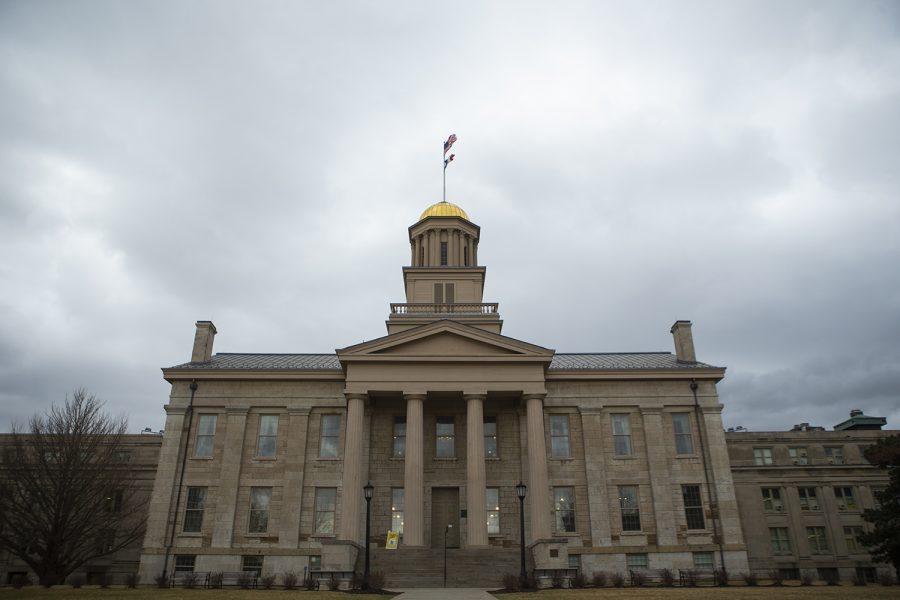Low enrollment leads to decrease in federal and institutional financial aid at Iowa’s public universities
Federal and institutional financial aid awarded to students at Iowa’s public universities has decreased for two years, but students are not being awarded less aid.
The Old Capitol is seen on Thursday, March 12, 2020.
February 16, 2021
Federal and institutional financial aid awarded to undergraduate and graduate students at Iowa’s public universities is down for a second straight year, according to the Iowa state Board of Regents annual financial aid report.
Driven by enrollment declines, the financial aid funding declined from $1.09 billion last year to $1.06 billion. Senior Communications Director for the regents Josh Lehman wrote in an email to The Daily Iowan that funding from private companies and corporations has increased in recent years.
As previously reported by the DI, state Board of Regents institutions reported an overall enrollment decrease of 4.4 percent for the 2020 academic year compared to fall 2019.
The University of Iowa saw a decrease of 792 students in total enrollment, a 2.5 percent drop from fall 2019 to fall 2020, the annual regent enrollment report said.
Lehman wrote that the reduction in total aid is because of enrollment declines, not a decline per student aid awards, and will not impact aid per student.
“While there are fewer students attending the Regent Universities, the average amount of aid per student is slightly higher in 2019-20 than it was in 2017-2018,” Lehman wrote.
In the 2019 to 2020 academic year, the UI awarded $102 million in financial aid to undergraduates, an $8 million decrease from the year before, the report said.
According to the financial aid report, 80 percent of undergraduate institutional aid takes the form of grants or scholarships. The UI provided $81 million in university scholarships and grants to undergraduate students from 2019 to 2020.
“The universities remain the single largest source of all scholarships and grants available to undergraduates,” the report said.
In June 2020, the regents approved a tuition freeze for the fall semester, and later voted to continue the freeze into the spring semester.
UI junior and co-administrator of the Hawkeyes for Fair Tuition group on Facebook Braden Chick said a lot of students he knows have to take private loans or Parent PLUS loans if they do not receive financial aid.
“That’s a lot of money to pay off the student loan debt,” he said. “There’s a burden on my parents because we have Parent PLUS loans, and that worries me. It worries them.”
According to the UI Office of Financial Aid website, a Parent PLUS Loan is “a credit-based loan and eligibility is determined by subtracting the financial aid that has been offered from the student’s estimated cost of attendance.”
Chick said he believes the price of tuition for an in-state public institution is too high. His Hawkeyes for Fair Tuition Facebook group advocates for a tuition reduction at the UI.
UI junior Cade Gerlach, the co-administrator of the Facebook group said as a result of this pandemic, students have not been able to get stimulus checks because they are dependents.
“The students who attend our university are some of the people who have been the worst off from the pandemic,” Gerlach said.
Lehman wrote that reducing and managing student debt is a focus for the regents and the regent universities. Each university requires students to take a financial literacy course, he wrote, and provides students with financial counseling if they need to consider financial assistance.
UI Director of Media Relations Anne Bassett wrote in an email to the DI that the UI Office of Financial Aid is committed to supporting students, and that the office consistently shares information throughout the year explaining the financial aid application process.
The report says 42.6 percent of students graduated with no debt from the UI. The average amount of debt for students who graduate with debt at the UI was $25,630 for Iowa residents and $31,205 for out-of-state students in 2019 to 2020.
Lehman wrote that the students attending regent public institutions graduate with lower debt than any other public institution in the state and compares favorably with other public universities in the nation.
“One key factor to reducing student debt is time to graduation, and that has been steadily decreasing at our universities,” Lehman wrote.






